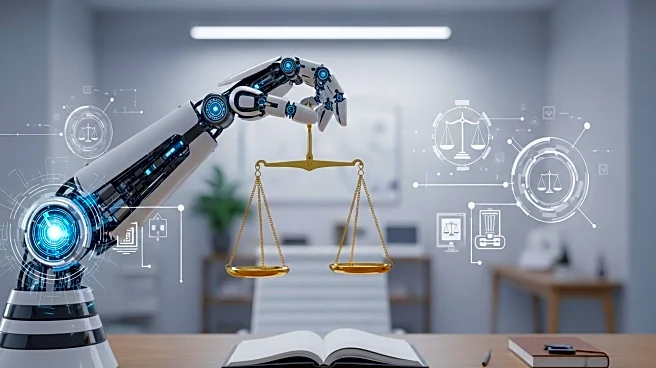What's Happening?
AI is increasingly being integrated into legal departments, fundamentally transforming the role of general counsels and the legal profession. This integration is not just about enhancing productivity and cost savings but also about redefining how legal departments can help businesses adapt and thrive in a complex environment. AI tools are being used to preserve institutional knowledge, reshape talent markets, and position general counsels as strategic leaders. These tools help legal teams retain critical knowledge, reducing the risk of losing expertise when key team members leave. AI also facilitates onboarding by providing new hires with immediate access to institutional wisdom, thus flattening the learning curve. This transformation is reshaping the legal profession by embedding institutional knowledge within organizations, making it accessible and dynamic.
Why It's Important?
The integration of AI in legal departments is significant as it enhances the strategic role of general counsels, allowing them to contribute more effectively to enterprise value. By preserving institutional knowledge and making it accessible, AI reduces the dependency on individual expertise, thus mitigating risks associated with employee turnover. This shift also impacts the lateral talent market, as firms can retain intellectual capital even when key individuals leave. The broader implication is a potential shift in the legal services market, with AI enabling more efficient and strategic legal practices. This transformation could lead to a reevaluation of traditional billing models and the emergence of new market dynamics, ultimately benefiting businesses by providing more consistent and informed legal counsel.
What's Next?
As AI continues to be integrated into legal departments, general counsels will need to navigate the balance between technological engagement and legal judgment. The legal services market is likely to see increased competition and innovation, with firms adopting AI to enhance their service offerings. General counsels will play a crucial role in shaping the future of legal services, determining which firms thrive in this new landscape. The ongoing transformation will require legal professionals to adapt to new technologies and embrace a more strategic role within their organizations. This evolution will also necessitate a cultural shift within legal departments, as they move from being passive consumers to active market makers in legal services.
Beyond the Headlines
The integration of AI in legal departments raises ethical and accountability questions, particularly regarding the boundaries between machine-driven insights and human legal judgment. As AI tools become more prevalent, legal professionals will need to address concerns about data security, regulatory compliance, and the potential for AI to influence legal decisions. The cultural transformation within legal departments will also require a reevaluation of traditional roles and responsibilities, as AI enables more collaborative and interdisciplinary approaches to legal practice. This shift could lead to a more dynamic and innovative legal profession, with AI serving as a catalyst for change.









